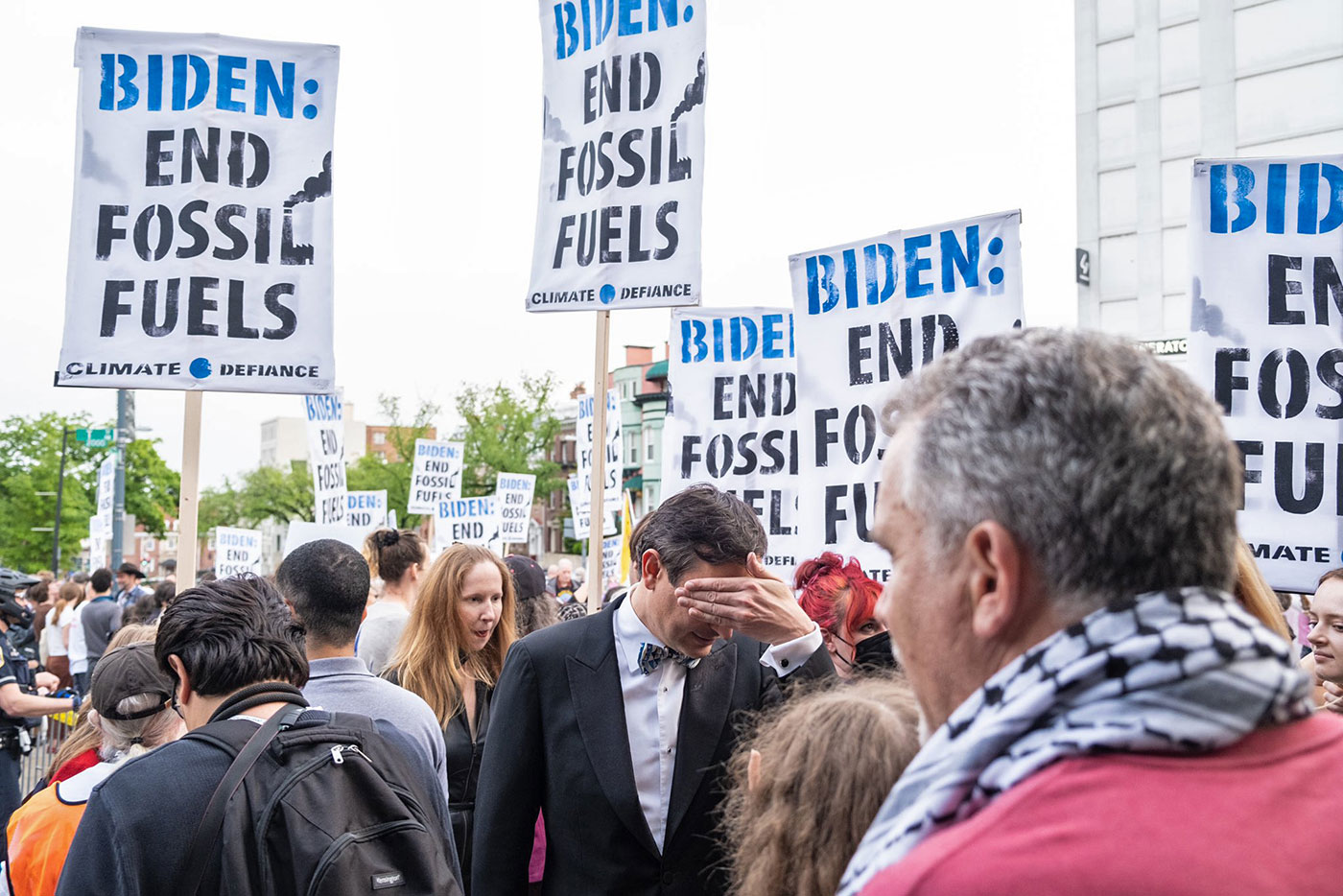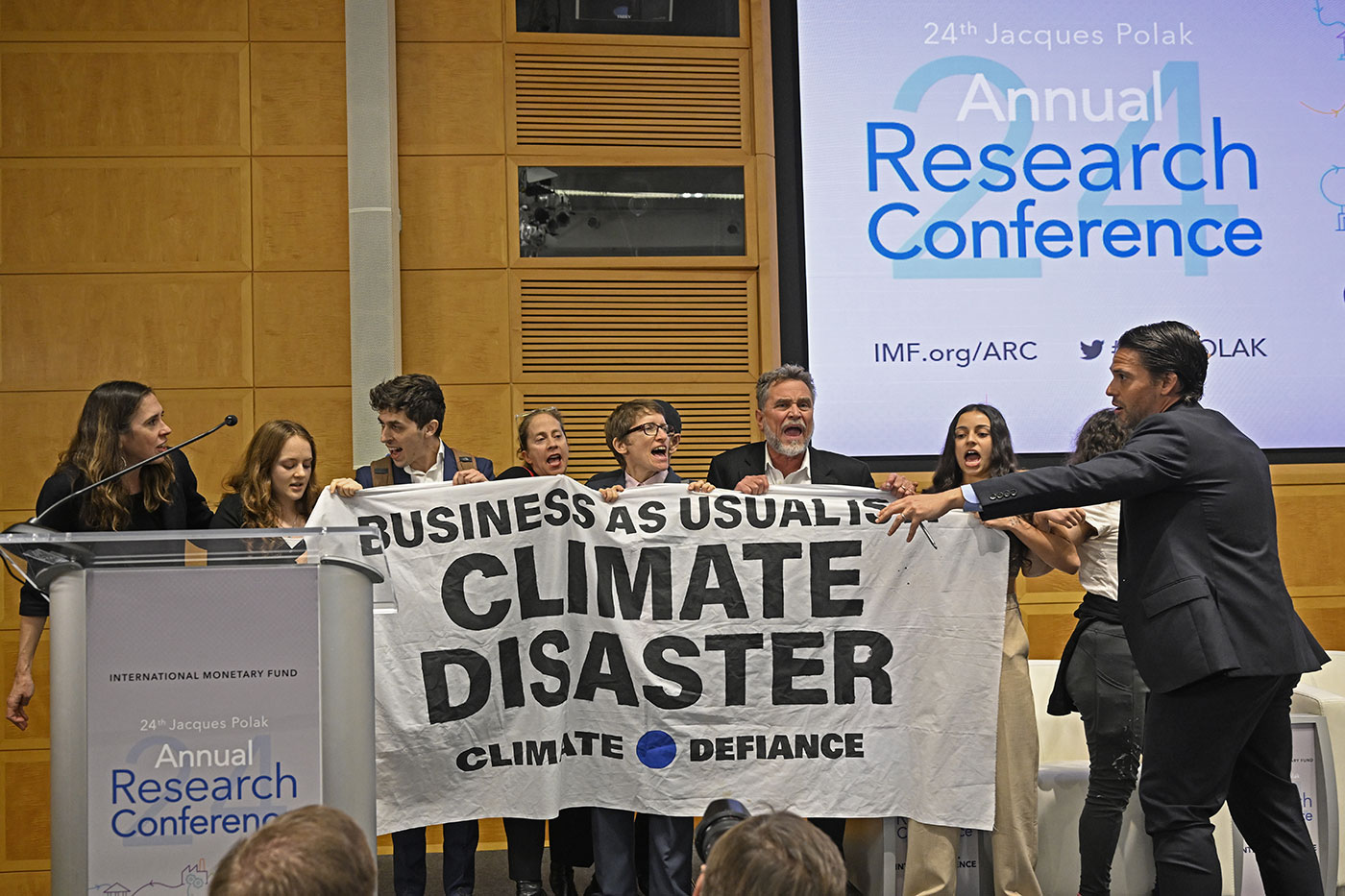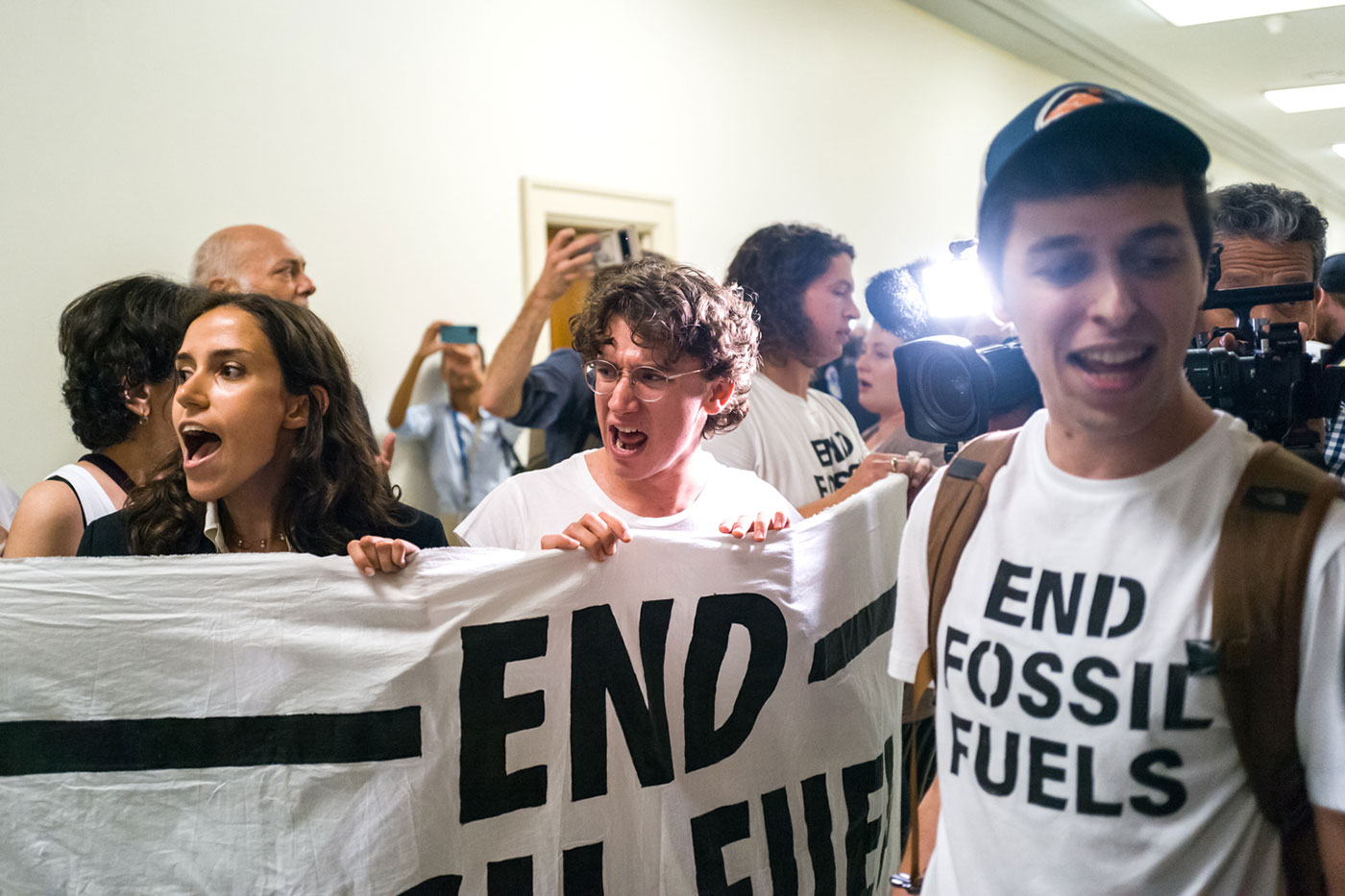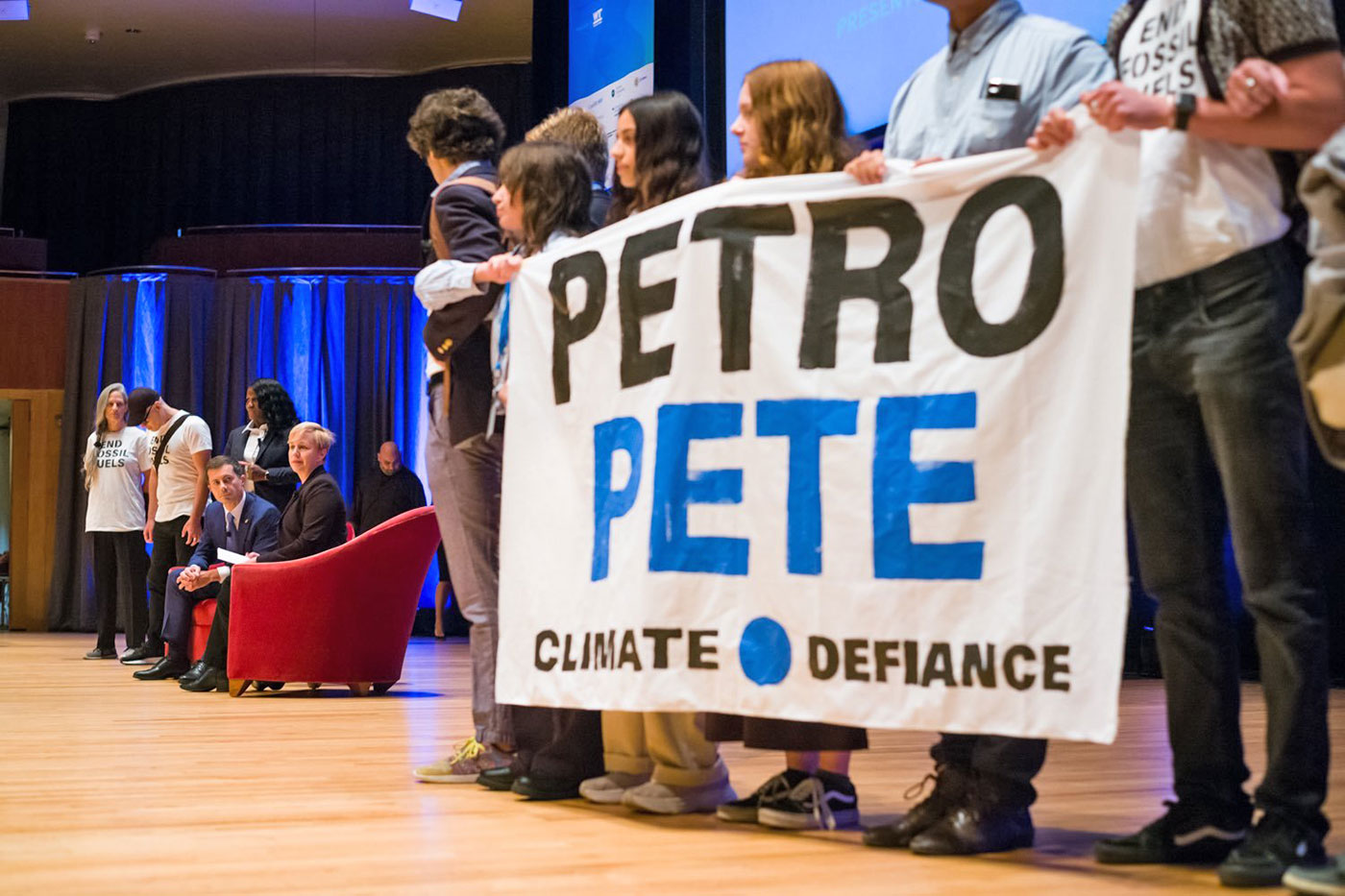This story is part of the Grist arts and culture series Moral Hazards, a weeklong exploration of the complex — sometimes contradictory — factors that drive our ethical decision-making in the age of global warming.
An unfailingly friendly 30-year-old with tousled black hair and a slight, willowy frame, Michael Greenberg almost never loses his beatific smile — not even when a black SUV is plowing straight toward him.
This apparent serenity makes it nearly impossible to imagine Greenberg uttering the following words, which he posted to X in May: “We are bold and brash. We get in your face and get in your space. We do not grovel. We do not make requests like Oliver Twist asking for gruel. We make life miserable for people in power. And we do not apologize. Respect us or expect us.”
As the founder of the activist group Climate Defiance, Greenberg has proven that he means what he tweets. Since the group’s founding last year, Climate Defiance activists have stormed dozens of formal events with the goal of, in their words, “ending the careers and decimating the reputations of those who disagree with us.” They’ve called Senator Lisa Murkowski, Republican of Alaska, a “murderer” to her face, told Senator Joe Manchin of West Virginia that he’s a “sick f***,” and demanded that Exxon Mobil’s CEO, Darren Woods, “eat shit.” In the last month alone, they’ve berated Occidental Petroleum’s CEO, Vicki Hollub, former Republican presidential candidate Vivek Ramaswamy, Canadian Prime Minister Justin Trudeau, and — for the sixth and almost certainly not final time — retiring Senator Manchin. On the strength of this chaos, the group raised well over $100,000 in just one week in September.
The group’s public shaming efforts have also sometimes targeted policymakers who have committed their entire political careers to fighting climate change. In the span of a few days in New York City last year, the group heckled President Joe Biden’s climate adviser, Ali Zaidi, four different times. “We confronted the National Climate Advisor with so much zeal that he fled his keynote and took refuge in a basement boiler room,” the group bragged in a recent fundraising email.

Greenberg takes climate change seriously in his private life as well. He doesn’t own a car, doesn’t eat animal products (thus cutting his dietary carbon emissions by roughly 75 percent), and minimizes air travel that isn’t necessary for his work. For Greenberg and his allies, however, personal choices about how to live in harmony with climate science are beside the point. The way they see it, the rich and powerful have thrown their lot in with those who have a vested interest in continued fossil fuel use, and this cabal is the main thing standing in the way of a fossil fuel-free future — rather than the carbon-intensive proclivities of millions and millions of people like me, who don’t quite have it in them to give up cheese, let alone road trips.
If plutocrats are the problem, then, it makes sense that upsetting the comfort and prestige enjoyed by these corrupted elites might be the best and perhaps only hope for getting them to change course. As Greenberg put it on a phone call with me, “We’re face to face with the people torching our planet.” His volunteers have been arrested, choked, tackled, and shoved to the ground for their trouble.
“They are going after villains,” said Margaret Klein Salamon, co-founder of the Climate Emergency Fund, a philanthropic venture that is Climate Defiance’s first major funder. “They’re quite savvy on social media. And they’re pissed. They have been betrayed by the elected representatives that are supposed to be representing them.”
The group represents something of a synthesis of trends that have developed in climate activism over the past decade: It combines anti-pipeline activists’ emphasis on disruptive direct action, the Sunrise Movement’s focus on expanding the terms of U.S. politics (think the Green New Deal), and Extinction Rebellion’s pursuit of virality and spectacle. The novel element that Climate Defiance adds to the mix (besides a penchant for profanity) is a reliance on public shaming, illustrated by its signature tactic of derailing formal speaking gigs. “Sunrise wasn’t shutting down speeches until we started doing it,” Greenberg told me.

In the lead-up to a Climate Defiance action in May, another leader of the organization told his assembled compatriots that one of his favorite activities was shaming people in front of their family and friends. “Of course, only if they’re the worst scum of the earth,” he clarified.
Climate Defiance activists are adamant that they’re not trying to change the minds of targets like Manchin, let alone those attending the events they disrupt, who are likely to respond to their stunts with awkward silence and a few jeers. Instead, the group’s public shaming is intended to galvanize the broader public to join them in righteous fury.
Though Greenberg is aware of the polling that shows climate change to be a low electoral priority for Americans — a major goal of the organization is to make climate a “top three issue in American politics,” he told me — he also believes that Climate Defiance can tap into the public’s dormant anger and build a mass movement. When touting the group’s success, Greenberg is fond of pointing to social media metrics: He told me that he thinks Climate Defiance has gotten more online engagement than all other green groups combined. “Our effect is almost 100 percent through social media,” one action leader said on a recent prep call.
Translating all this social media engagement into the mass mobilization that Climate Defiance envisions, however, is very much a work in progress. Turnout for individual actions has, at best, numbered in the dozens, and the rank-and-file participants I met over the past few months were typically seasoned veterans of groups like Extinction Rebellion in the New York City, Boston, and Washington, D.C., metro areas. It’s no surprise that a group this young would begin by building on a core of committed activists; what’s surprising is how much they appear to have already influenced the very elites that they harangue on a daily basis, even before it’s clear whether something as amorphous as “the public” is on their side.
In December, Greenberg and another Climate Defiance campaigner were invited to the White House to discuss policy with the Biden administration’s senior climate adviser, John Podesta, who they had chased off a stage eight months earlier. “I appreciate their passion,” Podesta said diplomatically over their heckling at the time, though he later confided to Greenberg that he found the organization to be a “pain in the ass.”

At the meeting, Greenberg expressed concern about a massive new natural gas export terminal in Louisiana that was up for federal approval; a month later, the administration pulled the plug on the project. Despite the lack of a clear causal connection between the two events, some observers, like Representative Ro Khanna, a Democrat from California, have credited Climate Defiance with the administration’s subsequent decision to slow-walk federal approval of all new natural gas export facilities. Though that policy change was nullified by a federal judge in July, it’s still listed as the top achievement on Climate Defiance’s website.
Even so, Greenberg still sees Climate Defiance as a band of outsiders. “I don’t have 50 senators’ numbers saved in my phone,” he told me, though he allowed that he might have saved a few numbers from the so-called Squad of left-wing Democratic representatives. Even that likely undersells his access: Khanna and Representative Pramila Jayapal of Washington have both shown up at Climate Defiance fundraisers, and a short list of funders includes heirs of the Disney and Getty oil fortunes, as well as Hollywood celebrities like Adam McKay and Jeremy Strong.
When I met up with Greenberg after his foiled attempt to blockade the Biden campaign headquarters in July — Climate Defiance was the first major environmental group to call on Biden to drop out of the presidential race — he told me that he’d missed a call from Zaidi, Biden’s climate advisor, just the week before. Greenberg had ignored it since he didn’t recognize the number at first — and he had seemingly been too busy planning protests against Zaidi’s boss to call him back.
Anyone looking to place Climate Defiance in the American activist tradition might first think of the Sunrise Movement, whose 200-person occupation of Nancy Pelosi’s congressional office in support of the Green New Deal in 2018 inspired Greenberg to engage in similar tactics. But Climate Defiance’s media-savvy theatrics hearken back to protests of the last century as well. Greenberg and Klein Salamon both speak of “making good trouble,” a nod to the late John Lewis’s quip about the Civil Rights Movement’s approach. And in targeting politicians and bureaucrats with public vitriol, the group also resembles ACT UP, the AIDS activist group known for disrupting church services, wrapping then Senator Jesse Helms’ house in a giant condom, and pelting the head of the Department of Health and Human Services, Louis W. Sullivan, with condoms during an event in 1990, shouting “shame, shame, shame” while they did so.
While your mileage may vary on those comparisons, such confrontational tactics have also been the stock-in-trade of People for the Ethical Treatment of Animals since its founding in 1980: “I’d rather go naked than wear fur” is probably PETA’s best-known slogan. Like Climate Defiance, many of its actions targeted public figures with surprise blitzes, as when four PETA activists stormed the runway at a Victoria’s Secret fashion show to unfurl a banner declaring Brazilian supermodel Gisele Bundchen “fur scum.” But it’s not only these headline-grabbing tactics that paved the way for what Climate Defiance is doing today — PETA founder Ingrid Newkirk once proudly declared her coterie “press sluts” — it’s also the rhetoric used to justify them.

Public figures, Newkirk once said, “needed to be reminded that if they make horrible, cruel decisions, there will be unpleasant consequences.” Likewise, Klein Salamon said of Climate Defiance’s targets, “They should feel so wracked by shame that their own conscience won’t give them peace.” Greenberg told me that the most consistent compliment he’s gotten about Climate Defiance is that the group goes after the people who are guilty. Or, as a volunteer put it more bluntly in a recent action-related group chat: “Let’s keep f***ing up shit until these shitty f***ers stop destroying our futures.”
How realistic, then, is the hope that the “shitty f***ers” in question will succumb to this mass shaming? Climate Defiance’s less-than-two-year record is too short to answer this question, but PETA’s half-century in the public consciousness might offer a hint.
While PETA has achieved only small successes in its quest to end systemic animal cruelty, its attention-grabbing PR campaigns have caused a sea change in the way that much of the public talks and thinks about animal welfare. Indeed, PETA has become virtually synonymous with the very concept of animal rights, at least in the U.S., and if you pluck a vegan or animal rights activist out of the population at random, there is a strong chance that PETA will be a part of their conversion story. As a result of this groundswell of support, meat, egg, and dairy producers have adopted meaningful reforms to mitigate the cruelest factory farming practices.
Zoom out a little, though, and PETA’s efforts begin to look paltry in comparison to the scale of the task. While roughly 1 percent of the U.S. population calls itself vegan, per capita meat consumption is at an all-time high. Factory farming not only retains its stranglehold on U.S. animal agriculture, but it has also been adopted by developing countries across the world. Every year, 80 billion-plus farm animals are slaughtered after lives of unimaginable pain and misery.
Climate activists are familiar with a similar dilemma: The harder they fight, the more that the better world they’re fighting seems to recede from view. The big difference is that environmental groups like Climate Defiance have been vastly more successful at getting elected officials to pay attention. Only in animal rights activists’ wildest dreams would a presidential administration devote its biggest legislative campaign to a comprehensive law aimed at addressing their cause, as the Biden administration did in its push for the misleadingly named Inflation Reduction Act.
When I spoke to Greenberg in August, he was preparing for his first meeting with a representative from Kamala Harris’ staff — his first-ever sit-down meeting with a presidential campaign. He told me his three demands for the incoming administration are asking them to stop two newly built pipelines — Line 3 and Line 5 — that transport Canadian oil through U.S. and tribal land in the Upper Midwest, and ending federal subsidies for fossil fuel production.

Given the group’s apocalyptic view on the stakes of the climate crisis, those demands struck me as alarmingly modest. Even if Enbridge, the Canadian multinational behind the two pipelines, stopped all oil from flowing tomorrow, other producers — from, say, the U.S. or Saudi Arabia, which together produce a third of the world’s oil — would happily step up to fill the gap in the world oil market. Meanwhile, tax breaks and other forms of support for U.S. fossil fuel producers clock in at less than $5 billion per year. That might sound like a lot, but it’s essentially a rounding error for an industry that pulled in more than $250 billion in profits over the last three years.
“At the very least we should not spend taxpayer money to subsidize a death cult,” Greenberg told me as an explanation for his focus on subsidies.
When I pointed out that Line 3 was already complete and carrying oil, Greenberg admitted that getting the government to somehow dismantle the pipeline was a “long shot.” The focus on Line 3 may be motivated more by the fact that Kamala Harris’s running mate for the White House, Governor Tim Walz of Minnesota, chose not to oppose the pipeline’s construction. When I asked Greenberg what Climate Defiance had been up to in the weeks since Harris assumed the Democratic nomination in August, he pointed me to an X thread that Climate Defiance composed explaining why Walz was “a bona fide climate criminal.” To me, it seemed that Greenberg was not offering climate solutions to the next administration — he was offering climate absolution.
That offer seemed implicit in the group’s tepid endorsement of Harris, which reiterated Greenberg’s criticisms of the candidate and her running mate. But having been given an ear by a potential presidential administration — after his first sit-down with the campaign, Greenberg soon secured a follow-up meeting with Harris’ top climate adviser, Ike Irby — it’s unclear if Climate Defiance can do more good outside the circle of power than it can within it. According to polling, Americans increasingly understand that humans are driving climate change, and they’re more aware than ever that a supercharged heat wave, drought, or flood might come for them soon. But they remain unwilling to sacrifice much to stop it. This impasse might place a pretty low ceiling on Climate Defiance’s attempts at mass mobilization.
It’s a lesson that the group’s predecessors have learned the hard way: Peter Singer, the philosopher whose work on animal rights has provided much of the theoretical heft for PETA’s crusade, said he once thought that the unassailable logic of animal rights — that, say, if you object to someone breaking a dog’s neck for pleasure you must also object to the mass mutilation of chickens for your dinner table — would win a critical mass of converts who would stop eating pigs, chickens, and cattle, thus ending factory farming. “The idea was that once people know, they won’t participate,” he recently told Vox. “And that hasn’t quite happened.”

The same story is already playing out with cutting carbon emissions. Climate change is a problem so far-reaching that it’s impossible to catalog all the responsibilities it seems to place upon those of us who cause it. Maybe we can admit that we should live more like Greenberg — that we should give up many of the foods we love, that we shouldn’t crisscross the world in airliners just to see something new. But not all emissions are frivolous. What about the 10 percent of U.S. emissions that are accounted for by health care? Or, to put things into more personal terms: No fossil fuel executive hoodwinked me into buying and burning two dozen gallons of gasoline to return home to North Carolina last week; instead, I made a choice about what was important to me and my family — a choice that involved damaging, however invisibly, a world that isn’t mine alone.
Climate Defiance, and the U.S. climate movement more broadly, seem to have concluded that these questions are between individuals and their own consciences, so they focus on collective opportunities — moments when the right disruption of the status quo could bend the arc of history closer to a carbon-free future. Climate change threatens billions of living organisms across the world, human and nonhuman alike, so these opportunities are hardly ours to waste.
It’s an inspiring idea, but I couldn’t help but wonder how seriously Greenberg takes it. When I asked him whether he thought future generations would look back with greater shame upon global warming or factory farming, he said he thought both would be received with equal horror. Greenberg quickly added that this sort of sober historical hindsight might not be possible, because the likeliest end result of a warming planet will be the collapse of civilization as we know it.
It’s this temperature-driven apocalypse that Climate Defiance is ostensibly dedicated to stopping. But in his zeal for standing in judgment of those he’s deemed “climate criminals,” Greenberg seems to be hedging his bets — if the world ends in spite of his efforts, maybe the righteous will somehow be saved. All of us sinners, however, may well be out of luck.




